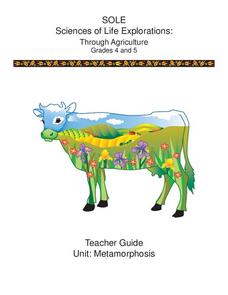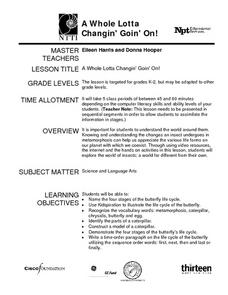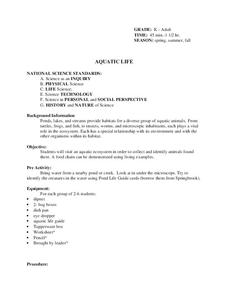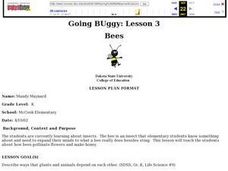National Park Service
The Secret of Life
Dead trees provide nutrients for the soil, food for animals, protection and a home for organisms, a seed-bed for new trees, and a place for nitrogen-fixing bacteria to live. In the activity, pupils collect decaying logs, expose them to a...
Cornell University
Metamorphosis
Looking for an insect unit that addresses multiple skill strategies? Young entomologists explore multiple life cycles of insects that go through metamorphosis. The brainteasers and mobile activity spark learner interest before guiding...
Curated OER
A Whole Lotta Changin' Goin' On
Here's a fabulous activity on the life cycle of a butterfly. Youngsters are able to identify and understand the four stages of life. They construct models of a caterpillar and write a sequence story about the life of a butterfly. This...
Curated OER
Classifying Plants and Insects
Art and science come together in a lesson based on Flower Still Life by Ambrosius Bosschaert the Elder. Learners classify plants and insects in the painting by color, leaf shape, size, reproduction, and season of bloom.
Curated OER
Cycles of Life
Students explore the metamorphosis of an insect as it changes from an egg to pupa to an adult. the process of change is observed, recorded, and transformed into a life cycle picture.
Curated OER
The Lifecycle of a Butterfly
Students study the life cycle of the butterfly. In this butterfly life cycle lesson, students examine and discuss a large diagram of the four stages of the butterfly life cycle. They read books and access web sites that extend their...
Curated OER
Life Cycle: Diversity in a Balance
In this life cycle workbook, 3rd graders complete several different activities in which they analyze different invertebrates, identify arthropods, examine human biology and plants, and study natural environments. 20 different activities...
Curated OER
Get to Know- Insects, Spiders and Others
Students investigate live insects. In this insects and spiders lesson, students work in groups to explore the outdoors and capture insects. Students observe, discuss and record information about the insects they discover. Students...
Curated OER
Salmon Life Cycles
Students list salmon life cycle stages in order, list three threats that salmon face throughout their lives, and examine important role native fish play in aquatic food chains throughout their life cycles.
Curated OER
Butterfly Life Cycle
Second graders explore biology. In this life cycle instructional activity, 2nd graders act out the stages a caterpillar goes through to become a butterfly. They spend days prior to this instructional activity observing caterpillars they...
Curated OER
Urban Life: What Lives in Our Schoolyard?
Learners research living organisms by exploring their school grounds. In this microscopic observation lesson, students gather materials, insects, and objects from their playground and schoolyard and bring them into class. Learners...
Curated OER
Insects
Students observe and identify insects in their local. They record their observations by drawing a picture of the insect and writing a description.
Curated OER
Insect Conservation
Students make a diorama. In this insect lesson plan, students review what they know and what they need to know about insects. Students define conservation, discuss why it is important to conserve insects, and make an insect diorama.
Curated OER
Insects Are Helpful!
Students see that insects do lots good and are very valuable to humans and nature. This is part of an ongoing effort to dispel fears of insects. They rotate through a series of centers that have examples of how insects contribute to our...
Curated OER
A Bug's Life: Diary of an Insect's Metamorphosis
Fifth graders examine the stages of insect's to understand heredity. For this inherited traits lesson, 5th graders explore the life of the honeybee for its inherited traits. Students recognize the difference between inherited traits and...
Curated OER
Invertebrate Vocabulary-- Marine Invertebrate Match
In this science worksheet, students study 12 vocabulary words which pertain to marine invertebrates. Students read the definitions which include pronunciation, part of speech and meaning of the name. Students then look at 16 organisms...
Curated OER
The Spider's Life Cycle
Students see that spiders have a life cycle, and reproduce by laying many eggs. We can count by ones, twos, fives, or as many as we want. They make two lists of animals on a chart.
Curated OER
Life in a Log
Students identify insects living in rotting logs. For this decomposition lesson, students observe pieces of a rotting log, they look at the insects that have inhabited the log and create a chart that shows their findings.
Curated OER
Are You One Of Us?
Students discover how to classify things based on their similarities and differences. Students give the characteristics of insects and create a classification list. Given examples of various types of insects, students classify them...
Curated OER
Crickets Guided Discovery
Sixth graders investigate insect anatomy by analyzing a live cricket. For this insect science lesson, 6th graders discuss their knowledge of insects and describe their characteristics from memory. Students observe live crickets in...
Rainforest Alliance
Colombia Biodiversity
How diverse is the rainforest? How much more diverse is a rain forest than a temperate forest? Explore these focus questions in a lesson that explores the plants, animals, and insects in forests. After listening to a reading about...
Curated OER
Insect Anatomy
Young scholars explore the anatomy of an insect. In this activity the characteristics of insects, students explore parts of an insect. Young scholars gain knowledge through pictures and charts showing insects and their body parts....
Curated OER
Aquatic Life
Students explore aquatic life. In this science instructional activity, students visit an aquatic ecosystem and collect animals found there. Students create a food chain for the aquatic ecosystem.
Curated OER
Going Buggy: Lesson 3: Bees
Students review the characteristics of insects they have already been introduced to. As a class, they are introduced to the characteristics of bees and what it can do instead of sting. To end the lesson, they discuss how plants and...

























